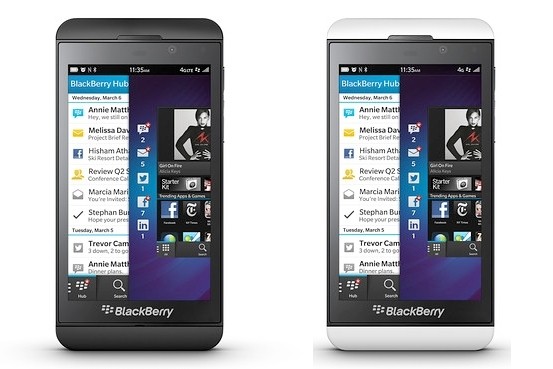Today's a big day for the BlackBerry platform. The launch of a new operating system built from the ground up and new hardware to go with it could very well set the stage for a much anticipated comeback into the modern smartphone race, or seal its decline into irrelevancy. The company knows everything that's at stake here and is kicking off its relaunch by dropping the Research in Motion name and rebranding itself as BlackBerry.
CEO Thorsten Heins talked about how they've reinvented the company over the course of BlackBerry 10's buildup and said that going forward they want to represent this by bringing everything together under one brand.
Hardware
The Z10 will be the company's first full-touch smartphone running the new BB10 operating system. If you've been following BlackBerry in the news at this point you're probably already familiar with some aspects of the phone thanks to a stream of leaks over the past few weeks. Design wise it looks like a beefier version of the iPhone 5 with similar touches at every angle – the corners, the surface space on both ends of the screen, the solid band of metal that runs around the casing. But it's also different in other aspects, of course.

The device features a larger 4.2 inch 1280 x 768 (356 PPI) screen and no home button whatsoever. Inside you'll find a dual core 1.5GHz processor, 2GB of RAM, 16GB of internal storage expandable through microSD, rear (8MP) and front (2MP) cameras, and all the usual array of connectivity options and sensors – Wi-Fi, GPS, Bluetooth 4.0, NFC, an accelerometer, magnetometer, gyroscope, and ambient light sensor.
Details are scant for its Q10 sibling besides Heins noting that it will sport a physical Qwerty keyboard and a 3.1-inch, 330PPI screen. More details about this model were promised further ahead along a launch in April.
Software
But of course hardware is only one part of the story. The star of the show is actually BlackBerry 10, the new operating system that should finally bring the company up to speed with iOS and Android – or so the company hopes. Among its key features are the ability to switch between professional and personal profiles on a single device, a centralized location for all your messages and social media updates, a word recognition system to make typing easier, and free voice calling with screen sharing integrated into BlackBerry Messenger.
The company bragged about having the largest number of apps for any first generation launch at 70,000, and though they managed to get some big names on board we'll reserve judgement on the other ~69,950.
Availability
Carrier support will be crucial for the fight to stay afloat and so far they have all four major US providers on board. The Z10 will be available on Verizon and AT&T equipped with LTE radios for $199 on contract – initially BlackBerry mentioned a three year contract but some are reporting a standard two year commitment. T-Mobile and Sprint will also be involved with BB10 but they haven't announced what phone they'll carry.
Release dates will be in the "middle of" March for the US market, but UK customers can get their hands on the BlackBerry Z10 starting tomorrow and those in Canada will only have to wait until February 5.
What reviewers said
Reviews for BlackBerry 10 and the Z10 are already popping up around the web with mixed comments about hardware design, usability, third party app support, and battery life. Check them out.
The Verge: "The Z10 is a good smartphone. Frankly, it's a better smartphone than I expected from RIM at this stage in the game. It does everything a modern phone should do, usually without hesitation. The problem with the Z10 is that it doesn't necessarily do anything better than any of its competition."
Engadget: "As a replacement for older versions of BlackBerry OS, BB 10 is a huge step out of the dark ages of mobile OS design. It's something that finally feels intended for a modern, full-touch device, yet still offers the core productivity focus we think BBID-holders will like. Does it have mainstream appeal? Yes, it does, but we're not sure a great stock keyboard and some trick gestures are enough to unseat the current kings of mobile devices."
Cnet: "Although it builds off previous BlackBerry operating systems, BlackBerry 10 is a brand-new thing. [...] On the whole, it's more sophisticated right out the gate than Microsoft's first iteration of the Windows Phone OS, though some of what RIM left out – like a way to click-to-call from any app – leaves me scratching my head."
AllThingsD: "The Z10 and BB10 represent a radical reinvention of the BlackBerry. The hardware is decent and the user interface is logical and generally easy to use. I believe it has a chance of getting RIM back into the game, if the company can attract a lot more apps."